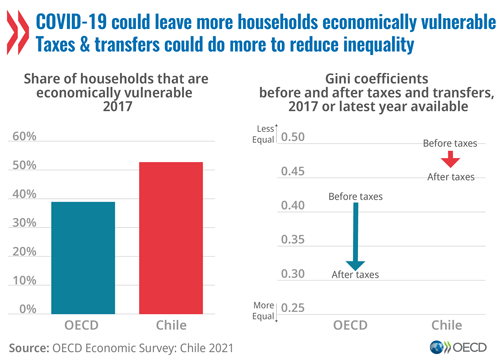Chile
Chile: focus on reducing inequality to strengthen social and economic recovery from COVID-19
04/02/2021 - Chile has been plunged into recession by the double shock of the late-2019 social protests and the ongoing COVID-19 crisis. Sound public finances have enabled bold stimulus action to support the economy, yet risks remain. Once the health crisis is under control, and the recovery well underway, reforms should focus foremost on boosting job creation and making growth work for all, according to a new OECD report.
The latest OECD Economic Survey of Chile sees the economy recovering gradually over the next two years, with activity back at pre-pandemic levels around late 2022. The Survey projects GDP growth at 4.2% in 2021 and 3.0% in 2022, after a drop of 6.0% in 2020, though it notes that the evolution of the pandemic remains a major risk. Any resurgence of social conflict could also dampen the pace of recovery, as could political uncertainty over upcoming elections and an ongoing constitutional review.
Scars will remain, as a surge in unemployment to levels not seen since the 2008 global financial crisis and strained corporate balance sheets will leave firms and households in a precarious situation for some time. Persistently high inequality was already a key challenge for Chile where, despite progress in reducing poverty, 53% of households are classed as economically vulnerable, meaning they have no financial cushion to protect against a sudden drop in income, compared to an OECD average of 39%. Chile’s system of taxes and transfers does much less to reduce income inequality than in most other OECD countries.

“Strong institutions and sound public finances are helping Chile to weather the crisis, yet many households still face severe difficulties,” said Alvaro Pereira, OECD Director of Economic Country Studies, presenting the Survey alongside Chilean Finance Minister Rodrigo Cerda. “Adjusting taxes and transfers could reduce the number of economically vulnerable households, and investing in education and skills will reduce inequality over the long term. The COVID-19 crisis offers an opportunity to create consensus on reforms to ensure strong public services, a dynamic business sector and a fairer society where all Chileans can share the fruits of economic growth.”
The Survey recommends continuing support to firms, especially small businesses, and cash transfers to vulnerable families until the recovery is underway. It welcomes a two-year emergency package of enhanced income support for households with unstable incomes, hiring subsidies, public investment and liquidity measures for firms in need. It says temporary protection to the newly unemployed could be extended, and a single pool of healthcare funding should be created to cover common services for all. It is also vital to create the conditions for midsize firms to flourish so they can drive the recovery and create jobs.
Broadening the income tax base, by lowering the thresholds for both the top and bottom tax brackets, and eliminating unnecessary tax exemptions, would be a start towards building a more effective tax and transfer system. Some of the extra revenue raised could finance a negative income tax, assuring each household and individual a basic benefit, the Survey says.
Public spending on primary and secondary education, currently among the lowest of OECD countries, should be increased. Access to quality education in Chile is strongly linked to socio-economic status, which perpetuates inequality. Improving education for all would be a way to address some of the discontent over unequal incomes and living standards that ignited the social protests of 2019.
In the business sector, improving competition, encouraging the adoption of digital technology and reducing the complexity of regulatory procedures would drive productivity gains and help firms to grow. Chile is a digital leader in Latin America but still needs to improve access to high-speed Internet, notably in rural areas, step-up firms’ adoption of digital tools and improve digital skills across the workforce, enabling all Chileans to benefit from the digital transformation.
See an Overview of the OECD Economic Survey of Chile 2021 with key findings and charts (this link can be included in media articles)
For further information, journalists are invited to contact Catherine Bremer in the OECD Media Office (+33 1 45 24 80 97).
Working with over 100 countries, the OECD is a global policy forum that promotes policies to improve the economic and social well-being of people around the world.
Related Documents